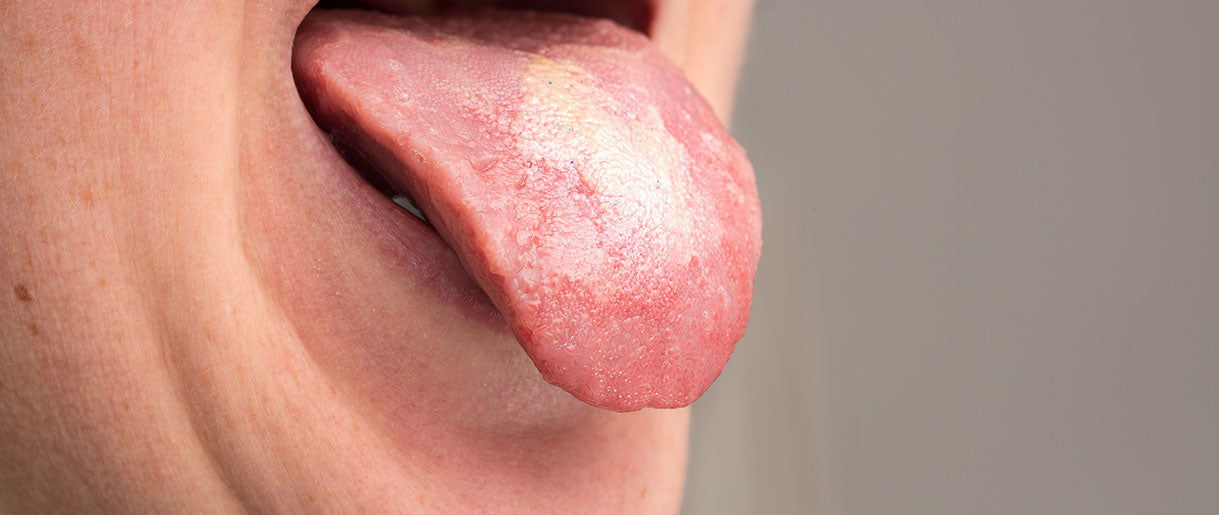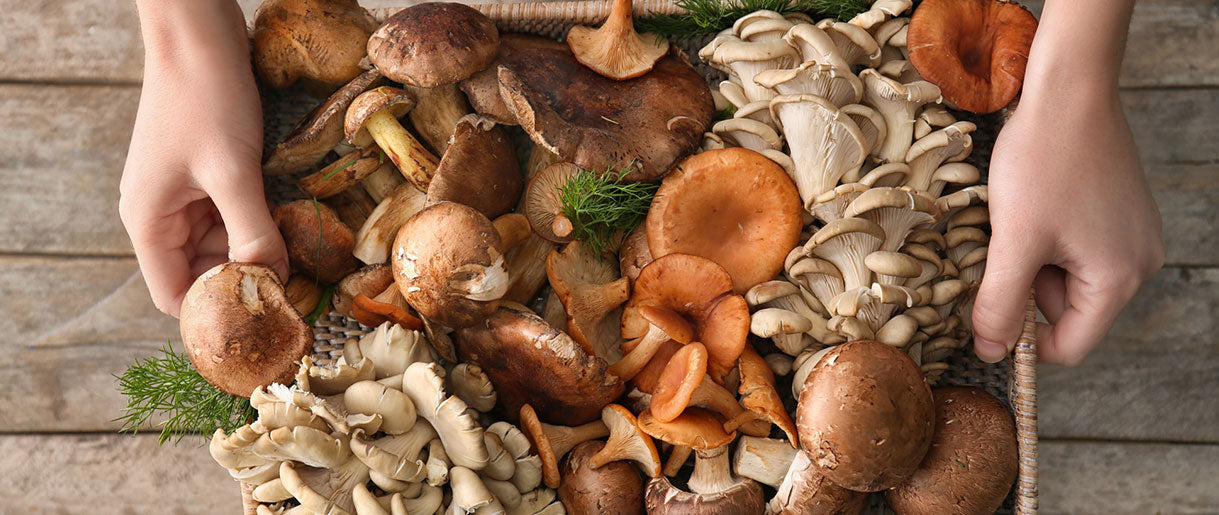Mushrooms have been traditionally used in various cultures due to their potential health benefits, including hormone balance. Certain types of mushrooms, such as Reishi, Lion's Mane, and Cordyceps, are believed to play a role in regulating hormones. These fungi are rich in bioactive compounds that may influence the endocrine system, aiding in balancing hormonal levels.
For instance, Reishi is said to help manage stress and support adrenal function, indirectly aiding in hormone regulation. Meanwhile, Lion's Mane may benefit cognitive function and mood, and Cordyceps is often linked with improved energy and libido. In addition, their bioactive compounds support detoxification processes, balance bodily stress, and help modulate the immune system, all essential for maintaining balanced hormonal levels.
Hormones affect and regulate numerous physiological processes in the human body, and various undesirable symptoms can result when they are out of balance. For example, poor sleep, mood swings, digestion problems, and even problems with your sex drive could be caused by inadequate serotonin hormone levels.
This article will discuss everything you need to know about mushrooms for hormone balance. In addition, we will discuss each mushroom's specific benefits that help regulate hormonal levels. But first, let's better understand hormones and their roles in the body.
Understanding Hormones: The Chemical Messengers

Hormones, often called the body's chemical messengers, are crucial in maintaining overall well-being. They control primary bodily functions, from simple needs like hunger to complex systems like reproduction, emotions, and mood. Achieving hormone balance is the key to maintaining health and preventing disease.
Hormonal Imbalance: A Hidden Threat
Hormonal imbalance is any departure from normal levels of hormones in our bodies. This can lead to a range of health concerns, including autoimmune disorders.
Symptoms can vary significantly depending on which hormones or glands are not functioning correctly. For instance, thyroid disorders, menopause, diabetes, and polycystic ovary syndrome (PCOS) are common hormonal disorders often linked with unwanted symptoms like fatigue, irritability, low energy, and sleep disturbances.
Triggers of Hormone Imbalance: From Chronic Stress to Synthetic Toxins
Several external factors can throw our hormones off balance. These include synthetic toxins in our environment, unhealthy dietary choices, lack of exercise, poor gut health, and persistent stress. When these factors interfere with our hormones, the adverse effects can be far-reaching and often debilitating.
Restoring Hormonal Balance: The Power of Lifestyle and Adaptogenic Mushrooms
Restoring normal hormone levels becomes an important goal for relieving the common symptoms associated with these disorders and improving overall health. In addition, incorporating beneficial activity into a daily routine, like exercise, a balanced diet, and adequate sleep, can support hormone balance.
Natural solutions such as adaptogenic mushrooms are gaining popularity for their potential to restore hormonal balance, reduce stress, improve gut health, and offer relief from harmful toxins' adverse effects.
Interesting Read: See the health benefits of mushrooms.
4 Medicinal Mushrooms That Fight Hormonal Imbalances
Since ancient times, people have used mushrooms for their potent nutritional and therapeutic benefits—these fungi have made a name for themselves in traditional Chinese medicine. However, we can also use them for their powerful effects on reestablishing hormone balance and controlling various bodily systems.
Here are four medicinal mushrooms that support hormone balance:
1. Lion's Mane Mushroom For Boosting Happy Hormones

Lions mane is best known for its potential to promote the growth of nerve cells, which may support cognitive function and enhance memory. It has anti-inflammatory and antioxidant properties and potential digestive health and immunity benefits. The mushroom, however, also plays a crucial role in regulating hormones:
Boosts Serotonin And Dopamine
Hericium erinaceus, or Lion's mane, treats several psychological conditions—including depression and anxiety—which could result from hormone imbalance.
A research paper published in 2018(1) confirmed that Lion's mane treats depression by improving the levels of happy hormones—dopamine and serotonin. The mushroom also fights poor sleep quality, a common hormonal disorder side effect.
Promotes Neurogenesis
Hericium erinaceus can potentially influence hormone production by promoting the growth of nerve cells, specifically in the hypothalamus. In addition, this particular nootropic is believed to stimulate neurogenesis.
Interesting Read: Learn about Lion's mane neurogenesis benefits.
2. Reishi Mushrooms For Balancing Reproductive Hormones

Reishi is best known for its potential immune-boosting properties and ability to help reduce inflammation and promote relaxation. It is also believed to have potential mushroom benefits for cardiovascular health, liver function, mental clarity, and helping the body fight toxins.
In traditional Chinese medicine, Reishi is highly regarded for its overall health and longevity benefits and is often called the "Mushroom of Immortality." The mushroom is also effective in regulating hormone levels, providing the following benefits:
Regulates Production Of The Cortisol Hormone
Ganoderma lucidum, or Reishi, is an adaptogenic mushroom. One of the best adaptogens, it helps the body adjust to the effects of stress, helping restore hormonal balance and keeping stress levels from compromising your immunity.
Recent research(2) suggests that the use of Reishi can aid in maintaining the proper functioning of the adrenal glands, which produce cortisol. This hormone enables the body to cope with stressors. The mushroom's ability to fight stress hormones allows it to fight insomnia and boost sleep quality.
Regulates Female Hormones To Boost Fertility
Reishi also helps improve fertility by supporting and strengthening the adrenal glands. Additionally, the superfood fungi support reproductive health in women.
Reishi mushroom's estrogen detoxifying effects(3) have been reported, lowering the side effects of excessive female hormone levels.
Regulates Endocrine System Hormones To Fight PCOS And Promote Ovulation
Studies have shown a Reishi extract can help lower levels(4) of the 5-alpha reductase enzyme. This enzyme is a catalyst that changes testosterone from inactive to active (dihydrotestosterone). Increased levels of the androgenic hormone, also known as active testosterone, can result in polycystic ovarian syndrome (PCOS).
Read More: See Reishi's effect on the testosterone hormone.
Reishi mushrooms' opposing action on androgens can help manage the symptoms of polycystic ovary syndrome. In addition, Reishi mushroom can promote ovulation, which can help to regularize menstrual cycles. Finally, the mushroom's ability to control endocrine system hormones can fight various symptoms often associated with menopause.
Fights Insulin Resistance
Having balanced insulin levels is the key to maintaining healthy blood sugar levels. People with insufficient insulin levels—or those with insulin resistance—have diabetes. Reishi mushroom promotes the overall well-being of people with diabetes by fighting insulin resistance.
A study conducted in 2020(5) confirmed that Reishi could fight insulin resistance. In addition, another study(6) demonstrated that Reishi could be used to treat diabetes.
3. Maitake Mushrooms For Female Hormonal Balance

Maitake mushroom is best known for its potential immune-boosting properties. It contains beta-glucans, complex sugars that may enhance the immune system's ability to fight infections and diseases.
In addition to building a healthy immune system, Maitake is also known for decreasing inflammation and its antioxidant properties. In addition, it may potentially aid in regulating blood sugar levels and reducing high blood pressure. The mushroom is also effective in fighting hormone imbalances and promoting homeostasis.
Regulates Estrogen Production By Fighting Obesity
Maitake can restore blood sugar imbalance(7) and supports insulin sensitivity. Inflammatory markers and estrogen can be stored and released due to insulin resistance and excess body fat. Maitake can lessen these adverse effects by fighting obesity, weight gain, and insulin resistance.
Read More: See how Maitake promotes weight loss.
Regulates Menstrual Cycle
Studies have shown Maitake helps induce ovulation and regulate menstrual cycles in those with PCOS. In addition, it is beneficial for those with the condition due to its positive effects on insulin sensitivity and reducing inflammation(8).
Fights Hormonal Imbalance In Menopausal Women
Maitake mushrooms' abilities to fight female hormonal imbalance may benefit menopausal women. Therefore, it may help alleviate hot flashes and night sweats, enhance bone health, strengthen the immune system, and improve cardiovascular health in menopausal women.
4. Cordyceps Mushroom For Energy And Libido

Cordyceps is best known for its potential to enhance athletic performance and improve endurance by increasing oxygen utilization and promoting the production of ATP, the primary energy source for cells. It is also believed to have potential benefits for immune function, inflammation, and sexual health.
These benefits of cordyceps are connected mainly to its ability to influence hormone levels.
Fights Chronic Fatigue In Patients With Hormonal Imbalance
Cordyceps benefits include enhancing energy levels(9) and reducing physical fatigue, a common sign of hormonal imbalance. In addition, Cordyceps sinensis and militaris are known to boost energy levels—this suggests that they may influence thyroid hormones.
The hormone responsible for regulating the body's metabolism, the process by which food is converted into energy, is known as the thyroid hormone. Research has shown(10) Cordyceps can treat thyroid diseases.
Boosts Sex Hormones To Enhance Libido
Cordyceps may promote the production of certain hormones, such as testosterone, which can increase libido. Additionally, Cordyceps Sinensis is thought to improve blood flow, which may contribute to its potential benefits for sexual health.
Read More: See how Cordyceps boosts libido.
Mushrooms in Your Meals: Making it a Daily Delight

Incorporating medicinal mushrooms into your daily meals can be simple and enjoyable. Add them to stir-fries, soups, and salads, or blend them into your morning smoothies.
Certain types of mushrooms, like Shiitake, Maitake, and Reishi, can also be used in tea or coffee preparations. In addition, using medicinal mushrooms in various forms – fresh, dried, or as extracts – can offer you flexibility and convenience in your meal planning.
A Taste of Wellness: Delicious and Nutritious Mushroom Recipes
Here are a couple of quick and easy recipes to help you add mushrooms to your diet:
- Mushroom Omelette: Start your day with a nutrient-rich omelet. Add sliced Maitake or Shiitake mushrooms to your egg mix and cook as usual.
- Mushroom Soup: Make a simple yet delicious mushroom soup using a mix of Reishi and Cordyceps. Add onions, garlic, and your choice of herbs for extra flavor.
- Mushroom Tea: For a soothing drink, boil Reishi slices in water for a few minutes, strain, and enjoy a cup of Reishi mushroom tea. You can add honey or lemon for taste.
Remember, the key is experimenting with different recipes until you find what you enjoy the most.
Mushroom Supplements: A Market Overview

Mushroom supplements have grown significantly in popularity as people increasingly seek natural solutions for health concerns, including hormone balance. These supplements come in various forms—capsules, powders, tinctures, and even teas.
Some of the most popular mushroom supplements for hormone balance include Reishi, Cordyceps, Lions Mane, and Chaga. These supplements are often chosen for their purported benefits, like reducing stress, improving sleep, supporting gut health, and aiding in balancing hormones.
Selecting High-Quality Mushroom Supplements: What to Look For
When choosing a mushroom supplement to fight a common hormonal disorder or for other mushroom benefits, it's essential to consider several factors to ensure you're getting a high-quality product. Here are some tips:
Check the Label
Ensure the supplement is made from the fruiting body of the mushroom and not the mycelium. When comparing the mushroom fruiting body vs. mycelium, the fruiting body generally contains higher concentrations of beneficial compounds.
Organic and Sustainably Sourced
Opt for certified organic products from reputable suppliers to ensure they are free from harmful pesticides and contaminants.
Extraction Process
The extraction process can significantly influence the potency and effectiveness of the supplement. Therefore, look for products that use a dual extraction process to help ensure a higher concentration of the mushroom's active compounds.
Weighing the Pros and Cons: Mushroom Supplements for Hormone Balance
As with any supplement, it's essential to consider the pros and cons of using mushroom supplements for hormone balance.
Pros:
- Convenience: Supplements are a convenient way to incorporate medicinal mushrooms into your daily routine, especially for those who may not enjoy the taste of these fungi.
- Concentration: Supplements often contain concentrated forms of the beneficial compounds found in mushrooms, potentially offering a higher dose than you would get from dietary sources.
Cons:
- Quality Variation: The quality and potency of mushroom supplements can vary widely between brands, making it essential to choose carefully.
- Potential Side Effects: Although rare, some people may experience side effects like digestive upset or allergic reactions. Consulting with a healthcare provider before starting any new supplement regimen is recommended.
Remember, while mushroom supplements can offer numerous potential benefits, they should not replace a balanced diet and healthy lifestyle but rather act as a tool to enhance your overall health and hormone balance.
Professional Guidance: A Must Before Starting a New Regimen

Before you use medicinal mushrooms or mushroom supplements for hormone balance, seek professional advice. Hormones play crucial roles in regulating a wide range of physiological processes in your body. Therefore, starting a new regimen for hormonal health without professional consultation could potentially result in unintended consequences.
Healthcare professionals can thoroughly assess your current health status, consider any underlying conditions, and help determine if mushrooms or mushroom supplements are appropriate and safe for you. They can also guide you about potential interactions with medications you might already be taking, help monitor your progress, and adjust your regimen as necessary.
Interesting Read: Learn about Lion's mane drug interactions.
Discussing Medicinal Mushrooms with Your Healthcare Provider
To discuss the use of mushrooms for hormone balance with your healthcare provider, you need to be prepared. Here's how to approach the conversation:
Gather Information
Before your visit, gather as much information as possible about the types of mushrooms you're interested in and how you plan to use them. This might include the forms of mushroom you're considering (dietary, supplement, etc.), potential brands of supplements, and any specific health concerns you hope to address.
Open Discussion
Be open and honest about why you're interested in using mushrooms for hormone balance. Discuss your health goals and any symptoms you're experiencing. This will give your healthcare provider a clearer understanding of your needs and expectations.
Ask Questions
Don't hesitate to ask questions. For example, you might want to understand potential side effects, the best time to take the mushroom supplements, or how the mushrooms might interact with other medications or supplements you're taking.
Remember, your healthcare provider is a crucial partner in your health journey. Their guidance can help you use medicinal mushrooms safely and effectively to achieve optimal hormone balance.
Mushrooms For Hormone Balance
FAQs About Mushrooms For Hormone Balance
Can Mushrooms Help Balance Hormones?
Certain mushrooms can help with restoring hormonal balance. For example, Lion's mane mushrooms have been shown to promote the growth of nerve cells in the hypothalamus, which can regulate hormone production.
Reishi has been traditionally used to support adrenal gland function, which can help regulate the production of cortisol, a hormone involved in stress response. Additionally, Cordyceps has been shown to potentially improve hormonal levels by promoting the production of certain hormones, such as testosterone.
What Mushrooms Help With Hormones?
Lion's mane, Reishi, Cordyceps, and Maitake have the potential to help with hormones. The growth of nerve cells in the hypothalamus, stimulated by Lion's mane mushrooms, can promote hormonal balance by regulating hormone production. Reishi is known for its traditional use in supporting adrenal gland function, which helps regulate the production of cortisol, a hormone involved in stress response.
Cordyceps mushrooms are believed to improve hormonal balance by increasing the production of specific hormones, including testosterone, thereby enhancing libido. Similarly, Maitake mushrooms may aid in regulating blood sugar levels, which can contribute to maintaining hormonal balance.
Are Mushrooms Good For Estrogen?
Some mushrooms may positively affect estrogen levels, but the research on this topic is still limited and inconclusive.
Certain types of mushrooms, such as shiitake, Maitake, and oyster mushrooms, contain natural compounds called phytoestrogens. These compounds have a chemical structure similar to the hormone estrogen, which may have weak estrogenic effects in the body.
Studies have suggested that consuming mushrooms rich in phytoestrogens may help balance hormones in women experiencing menopause-related symptoms, such as hot flashes and mood swings.
Key Takeaways
Our bodies can suffer adverse effects from having too little or too much of a particular hormone, so it's critical to maintain hormonal balance. Reishi, Cordyceps, Lion's mane, and Maitake are some of the best mushrooms for hormone balance.
Paying attention to your mushroom intake can help maintain hormonal balance. Medicinal mushrooms are available in various supplements, ranging from capsules and tablets to powders and tinctures—choose from this array of medicinal mushroom supplements to keep your hormones in check.
Have you used mushrooms to keep your hormones balanced? What mushroom species have you used to improve your sleep cycle, fight infertility, improve the function of your adrenals, or as a treatment for other hormone-related problems? Let us know in the comments below.
References
- Therapeutic Potential of Hericium erinaceus for Depressive Disorder, (1)https://www.ncbi.nlm.nih.gov/pmc/articles/PMC6982118/
- A preliminary review of studies on adaptogens: comparison of their bioactivity in TCM with that of ginseng-like herbs used worldwide, (2)https://www.ncbi.nlm.nih.gov/pmc/articles/PMC6240259/
- Risks and benefits related to alimentary exposure to xenoestrogens, (3)https://www.ncbi.nlm.nih.gov/pmc/articles/PMC6104637/
- An Update on Plant Derived Anti-Androgens, (4)https://www.ncbi.nlm.nih.gov/pmc/articles/PMC3693613/
- Ganoderma lucidum Extract Reduces Insulin Resistance by Enhancing AMPK Activation in High-Fat Diet-Induced Obese Mice, (5)https://www.ncbi.nlm.nih.gov/pmc/articles/PMC7693844/
- Mushrooms of the Genus Ganoderma Used to Treat Diabetes and Insulin Resistance, (6)https://www.ncbi.nlm.nih.gov/pmc/articles/PMC6891282/
- Anti-diabetic effect of an alpha-glucan from fruit body of Maitake (Grifola frondosa) on KK-Ay mice, (7)https://pubmed.ncbi.nlm.nih.gov/17430642/
- Pharmacological and pharmacokinetic studies with agaricoglycerides, extracted from Grifola frondosa, in animal models of pain and inflammation, (8)https://pubmed.ncbi.nlm.nih.gov/22327864/
- Effect of Cs-4® (Cordyceps sinensis) on Exercise Performance in Healthy Older Subjects: A Double-Blind, Placebo-Controlled Trial, (9)https://www.ncbi.nlm.nih.gov/pmc/articles/PMC3110835/
- Dual-Directional Immunomodulatory Effects of Corbrin Capsule on Autoimmune Thyroid Diseases, (10)https://www.ncbi.nlm.nih.gov/pmc/articles/PMC5045992/









Let Us Know Your Comments